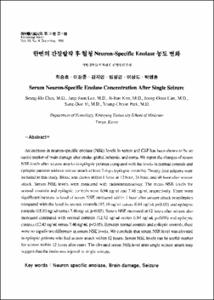한번의 간질발작 후 혈청 Neuron-Specific Enolase 농도 변화
- Keimyung Author(s)
- Kim, Ji Eun; Lim, Jeong Geun; Yi, Sang Do; Park, Young Chun
- Department
- Dept. of Neurology (신경과학)
- Journal Title
- Keimyung Medical Journal
- Issued Date
- 1999
- Volume
- 18
- Issue
- 4
- Keyword
- Neuron specific enolase; Brain damage; Seizure
- Abstract
- An increase in neuron-specific enolase (NSE) levels in serum and CSF has been shown to be an useful marker of brain damage after stroke, global ischemia, and coma. We report the changes of serum NSE levels after seizure attacks in epileptic patients compared with the levels in normal controls and epileptic patients without seizure attack at least 7 days (epileptic controls). Twenty-four seizures were included in this study. Blood was drawn within 1 hour, at 12 hour, 24 hour, and 48 hour after seizure attack. Serum NSE levels were measured with radioimmunoassay. The mean NSE levels for normal controls and epileptic controls were 6.94 ng/ml and 7.46 ng/ml, respectively. There were significant increase in level of serum NSE measured within 1 hour after seizure attack in epileptics compared with the level in normal controls (15.10ng/ml versus 6.94ng/ml, p<0.05) and epileptic controls (15.10ng/ml versus 7.46ng/ml, p<0.05). Serum NSE measured at 12 hours after seizure also increased compared with normal controls (12.32ng/ml versus 6.94ng/ml, p<0.05) and epileptic controls (12.43ng/ml versus 7.46ng/ml, p<0.05). Between normal controls and epileptic controls, there were no significant difference in serum NSE levels. We conclude that serum NSE level was elevated in epileptic patients who had seizure attack within 12 hours. Serum NSE levels can be useful marker for seizure within 12 hours after onser. The elevated serum NSE level after single seizure attack may suggest that the brain was injured in single seizure.
- Alternative Title
- Serum Neuron-
Specific Enolase Concentration After Single Seizure
- Publisher
- Keimyung University School of Medicine
- Citation
- 최승호 et al. (1999). 한번의 간질발작 후 혈청 Neuron-Specific Enolase 농도 변화. Keimyung Medical Journal, 18(4), 501–508.
- Type
- Article
- Appears in Collections:
- 2. Keimyung Medical Journal (계명의대 학술지) > 1999
1. School of Medicine (의과대학) > Dept. of Neurology (신경과학)
- 파일 목록
-
-
Download
 18-501.pdf
기타 데이터 / 404.88 kB / Adobe PDF
18-501.pdf
기타 데이터 / 404.88 kB / Adobe PDF
-
Items in Repository are protected by copyright, with all rights reserved, unless otherwise indicated.